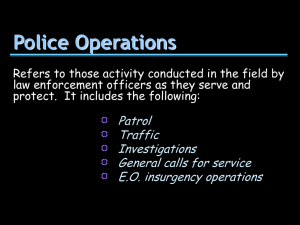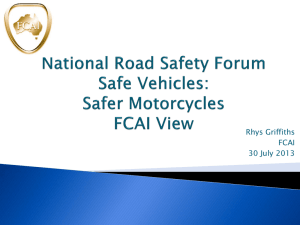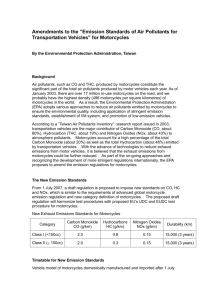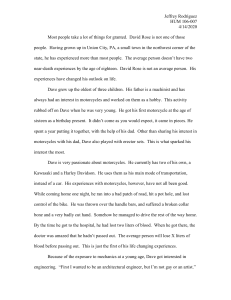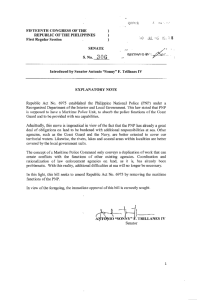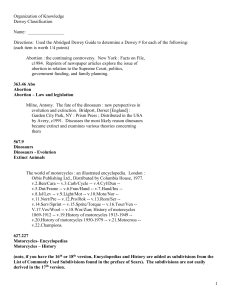FEB 1 5 2013 - PNP DIDM - Philippine National Police
advertisement
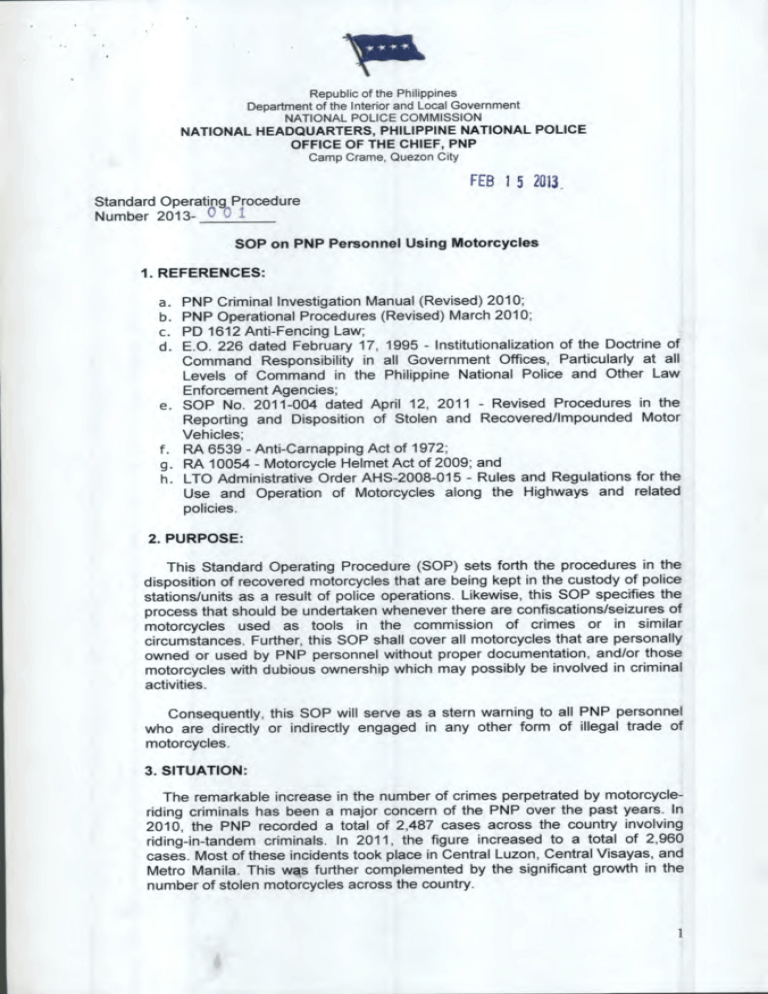
Republic of the Philippines Department of the Interior and Local Government NATIONAL POLICE COMMISSION NATIONAL HEADQUARTERS, PHILIPPINE NATIONAL POLICE OFFICE OF THE CHIEF, PNP Camp Crame, Quezon City FEB 1 5 2013 Standard Operating Procedure Number 20130 0 1 SOP on PNP Personnel Using Motorcycles 1. REFERENCES: a. b. c. d. e. f. g. h. PNP Criminal Investigation Manual (Revised) 2010: PNP Operational Procedures (Revised) March 2010; PD 1612 Anti-Fencing Law; E.O. 226 dated February 17, 1995 - Institutionalization of the Doctrine of Command Responsibility in all Government Offices, Particularly at all Levels of Command in the Philippine National Police and Other Law Enforcement Agencies; SOP No. 2011-004 dated April 12, 2011 - Revised Procedures in the Reporting and Disposition of Stolen and Recovered/Impounded Motor Vehicles; RA 6539 - Anti-Carnapping Act of 1972; RA 10054 - Motorcycle Helmet Act of 2009; and LTO Administrative Order AHS-2008-015 - Rules and Regulations for the Use and Operation of Motorcycles along the Highways and related policies. 2. PURPOSE: This Standard Operating Procedure (SOP) sets forth the procedures in the disposition of recovered motorcycles that are being kept in the custody of police stations/units as a result of police operations. Likewise, this SOP specifies the process that should be undertaken whenever there are confiscations/seizures of motorcycles used as tools in the commission of crimes or in similar circumstances. Further, this SOP shall cover all motorcycles that are personally owned or used by PNP personnel without proper documentation, and/or those motorcycles with dubious ownership which may possibly be involved in criminal activities. Consequently, this SOP will serve as a stern warning to all PNP personnel who are directly or indirectly engaged in any other form of illegal trade of motorcycles. 3. SITUATION: The remarkable increase in the number of crimes perpetrated by motorcycleriding criminals has been a major concern of the PNP over the past years. In 2010, the PNP recorded a total of 2,487 cases across the country involving riding-in-tandem criminals. In 2011, the figure increased to a total of 2,960 cases. Most of these incidents took place in Central Luzon, Central Visayas, and Metro Manila. This was further complemented by the significant growth in the number of stolen motorcycles across the country. 1 The most compelling issue, however, is the embarrassing public perception on the ineptness of the PNP in dealing with these crimes and the degrading assumption that some police officers are among those who use stolen or illegally acquired motorcycles. Moreover, there is also a prevailing observable unresponsiveness of some motorcycle-riding PNP personnel to existing rules and regulations on the use of motorcycles, particularly the "No Helmet, No Travel" and "No Plate, No Travel" policies and related traffic regulations. With this scenario, the PNP seems incapable of enforcing these regulations due to the blatant violations of the rules by its very own personnel. The seeming indifference to the strict observance of rules and the lack of discipline displayed by some PNP personnel using motorcycles further demonstrate the failure of their Chiefs of Offices/Unit Commanders to monitor and supervise them. 4. OBJECTIVES: a. To address the issue on the alleged involvement of some PNP personnel in the use of carnapped/stolen/recovered/impounded motorcycles; To strengthen the efforts of the PNP in promoting a stronger accountability of PNP personnel who own or possess motorcycles without any legal documents or proof of ownership, including recovered motorcycles of PNP stations/units and delinquent/unregistered motorcycles. c. To aid in the conduct of investigation of cases such as those involving motorcycle-riding criminals, motorcycle theft, and violation of the antifencing law; and d. To bolster the Doctrine of Command Responsibility in addressing the failure of immediate senior police officers relative to the involvement of their subordinates who are in possession/ownership of motorcycles without legal documents or who fail to present the same. 5. DEFINITION OF TERMS: The following operational terms used in this SOP are defined as follows: a. Motor vehicle - any vehicle propelled by any power, excluding muscular power, using the public highways but excepting road rollers, trolley cars, street-sweepers, sprinklers, lawn mowers, bulldozers, graders, fork-lifts, amphibian trucks, and cranes, if not used on public highways, vehicles, that run only on rails or tracks, and tractors, trailers, and traction engines of all kinds used exclusively for agricultural purposes; trailers having any number of wheels, when propelled or intended to be propelled by attachment to a motor vehicle shall be classified as a separate motor vehicle with no power rating. b. Doctrine of Command Responsibility — means that any government official or supervisor, or officer of the PNP or that of any other law enforcement agency shall be held accountable for "Neglect of Duty" under the doctrine of "command responsibility" if he has the knowledge that a crime or offense shall be committed, is being committed, or has been committed by his subordinates, or by others within his area of responsibility and, despite such knowledge, he did not take preventive or corrective action either before, during, or immediately after its commission. c. d. Fencing - the act of any person who, with intent to gain for himself or for another, shall buy, receive, possess, keep, acquire, conceal, sell or dispose of, shall buy and sell, or in any other manner deal in any article, item, object, or anything of value which he knows, or should be known to him, to have been derived from the proceeds of the crime of robbery or theft. Owner of motorcycle - refers to one who has the right to enjoy and dispose the motorcycle without other limitations than those established by law and is duly registered under his/her name in the Land Transportation Office. Likewise, it covers a person who acquired ownership of the motorcycle through a deed of sale with the intent of transferring ownership from the seller who is the legitimate owner. The owner of a government-owned motor vehicle is the agency to which the vehicle is registered. e. Spurious/Fraudulent document - refers to a fake or dubious document. f. Stolen Motorcycle - a motorcycle belonging to a rightful owner or from a person who legitimately acquired the said motor vehicle which was taken or carted away by another person, without the owner's consent g. Undocumented motorcycle — a motorcycle without legal documents to prove its ownership or possession. 6. SCOPE OF APPLICATION: This SOP shall apply to all PNP personnel using motorcycles of dubious status such as those that are personally owned but without proper documentation, stolen, recovered and impounded for safekeeping. The accountability for any violation of this SOP shall cover their respective heads/concerned supervisors who are tasked in accordance with the succeeding policies and operational procedures. 7. POLICIES: a. Command Responsibility at all levels of the organization shall be strictly observed. As such, the Chiefs of Offices/Unit Commanders in whose areas of jurisdiction the motorcycles are in custody should closely or personally direct their subordinates to present and properly account, record, and document the said motorcycles; b. Criminal and administrative charges will be filed against PNP personnel who are found to have in their possession and control motorcycles of dubious status. c. The erring personnel should bear the burden of proof on the legitimacy of its ownership. 8. OPERATIONAL PROCEDURES: The following are the operational procedures to be undertaken by all police stations/units: a. Dissemination of the Procedures All Chiefs of Offices/Unit Commanders shall make an accounting of their personnel who own or possess motorcycles. Chiefs of Offices/Unit Commanders shall direct their personnel to submit pertinent documents to prove ownership and legitimate possession of these motorcycles. All PNP personnel who are directed to present documents relevant to the same should comply within 15 days upon receipt of the written directive. b. Submission and Validation of Documentary Requirements 1) All PNP personnel shall submit, along with a written statement, copies of the following motorcycle documents attesting to the legitimacy of its ownership. Certificate of Registration; Official Receipt ; Invoice Receipt; Deed of Sale (if ownership has not yet been officially transferred to the possessor/owner); e) Certificate of Encumbrance (if under loan); f) Stencil of motorcycle's motor and chassis numbers; and g) Picture of the motorcycle with its license plate visibly appearing. a) b) c) d) 2) Failure to present the said documentary requirements within the given period shall be construed as a prima facie evidence that may be used as basis for the filing of appropriate criminal and administrative charges against non-compliant PNP personnel. 3) Consolidated copies of the submitted documents shall be formally endorsed to the concerned Provincial Highway Patrol Group /Regional Highway Patrol Unit (RHPU) of the Highway Patrol Group (HPG) for counter checking and validation purposes. 4) The validated compliances of PNP offices and units (including that of HPG) shall be forwarded to the DIDM for recording. c. Disposition of Stolen/Undocumented/Unregistered Vehicles 1) Within the allotted 15-day period, any police personnel in possession of a motorcycle that is stolen, previously recovered, undocumented, or acquired from an illegal source shall formally surrender said motorcycle to the custody of the Chief of Office/Unit Commander. The submission of fraudulent documents shall be treated separately, whether the ownership documents submitted by the police officer were authentic or not. 4 2) After the inventory of the turned-in or surrendered motorcycles, the Chief of Office/Unit Commander shall turn over all impounded motorcycles to the PHPT/RHPU of HPG within 48 hours from the time the 15-day period has lapsed. Motorcycles turned over to the HPG shall be covered with Technical Inspection Reports (TIR) and Acknowledgement Receipts. The concerned Chief of Office/Unit Commander shall submit a corresponding report to the DIDM. It should be understood that the turnover of motorcycles is in further compliance to SOP No. 2011-004 (Revised Procedures in the Reporting and Disposition of Recovered/Impounded Motor Vehicles). 3) The PHPT/RHPU shall likewise make the inventory and accounting of all turned-in motorcycles and shall keep a database of the same. These motorcycles shall be endorsed to the nearest PNP Crime Laboratory Office for the procedural macro-etching examination. 4) Results of the PNP Crime Laboratory physical inspection and related investigative findings of the HPG over these motorcycles shall be officially reported by the Director, HPG to the DIDM once obtained with copies furnished to IG, CL, and CIDG. 5) Appropriate dispositions shall be made by the HPG, particularly the notification of the owners of the motorcycles and subsequent processing of the lifting of alarm (if included in the list of stolen vehicles). d. Impounding Areas and Accountability During Safekeeping The Headquarters of the HPG shall maintain the present Central Vehicle Impounding Area (CVIA) in Camp Crame and all the Regional Vehicle Impounding Areas (RVIA). The designated Chief, CVIA and Chief, Regional/Provincial Impounding Area shall maintain a consolidated list of all impounded motorcycles and shall be accountable for the safekeeping and security of all turned-in vehicles until their release to legitimate owners or other dispositions authorized under the law. e. Creation of Inspecting and Monitoring Committee 1) An Inspection and Monitoring Committee shall be created at the National Level which shall be chaired by a representative of the HPG and representatives from IG, DI, CL, and DIDM as members. 2) At any time, after a one (1) month period of compliance given to all PNP offices and units, the committee shall visit police offices, units, and stations at random to ensure faithful and consistent observance of this SOP. 3) During the conduct of random/surprise inspections, any violations of the provisions of this SOP shall be documented by the team. Those who will still be found using recovered, stolen, undocumented, or illegally acquired motorcycles will face appropriate administrative and criminal charges. 5 f. Supplemental Procedures Dealing with Motorcycle-Using Personnel Who are Violating the Policies of No Helmet, No Travel and No Plate, No Travel and related regulations on the Use of Motorcycles: 1) Take pictures for evidentiary purposes; 2) Determine the complete identity of the personnel, including the police office or his/her unit assignment. 3) Endorse the case for investigation to the HPG or to the nearest police station; 4) Proceed to the investigating office to further impound and subject the motorcycle to procedural investigation in accordance with the above stated procedures; 5) Issue applicable traffic citation tickets and proceed with the appropriate reporting procedures especially the submission of an apprehension report to the DIDM (copy furnished the concerned office where the personnel is assigned); and 6) Initiate administrative proceedings through concerned offices against erring personnel without prejudice to the filing of criminal charges. (Attached is the flowchart on the Procedures and Disposition of Motorcycles Impounded.) 9. PENAL CLAUSE: Any violation of this SOP shall be dealt with administratively for Neglect of Duty or Nonfeasance under Section 1, RULE 21 of NAPOLCOM MEMORANDUM CIRCULAR No. 2007-001 and/or be held liable under the PNP Rules and Regulations. Likewise, Chiefs of Offices/Unit Commanders shall be investigated and be held accountable under the Doctrine of Command Responsibility without prejudice to the filing of criminal complaints against those who commit acts or omissions punishable under the Revised Penal Code or Special Laws. 10. REPEALING CLAUSE: All directives, letters of instructions, memoranda, rules and regulations, and other issuances issued by the PNP that are inconsistent or contrary herewith are deemed rescinded, amended, repealed, or modified accordingly. 11. EFFECTIVITY: This SOP shall take effect immediately upon approval. RID PURISIMA r General ALAN L Police Dir Chief, PN CERTIFICATE NUMBER AJA1CIAN1452 To Serve and Protect' CPNP u^ 'f3 S057365 S052365 SOP dissemination to all unit personnel MC-Using personnel to submit requirements or surrender MCs illegally possessed (15 days) \7 Heads /Chiefs of Offices to consolidate records and submit same to HPG Heads/Chiefs of Offices to impound surrendered MCs and turn-in to HPG \Z HPG to validate/countercheck MC Documents \7 HPG to initiate procedural investigation and dispositions. Crime lab to conduct macro-etching exam HPG results of validation/investigation to be submitted to DIDM (Copy furnish IG, Crime Lab and CIDG) Same impounding/investigation procedures on MCd found to be stolen, recovered, undocumented or illegally acquired N DIDM to initiate administrative case or refer derogatory findings to the concerned Chief for appropriate action \T Concerned personnel and head of office/Unit Chief to face appropriate charges if found violating or remiss on this SOP N Conduct of random inspection by team composed of DIDM, DI, CL and HPG
